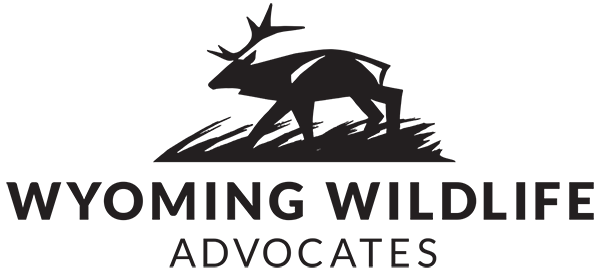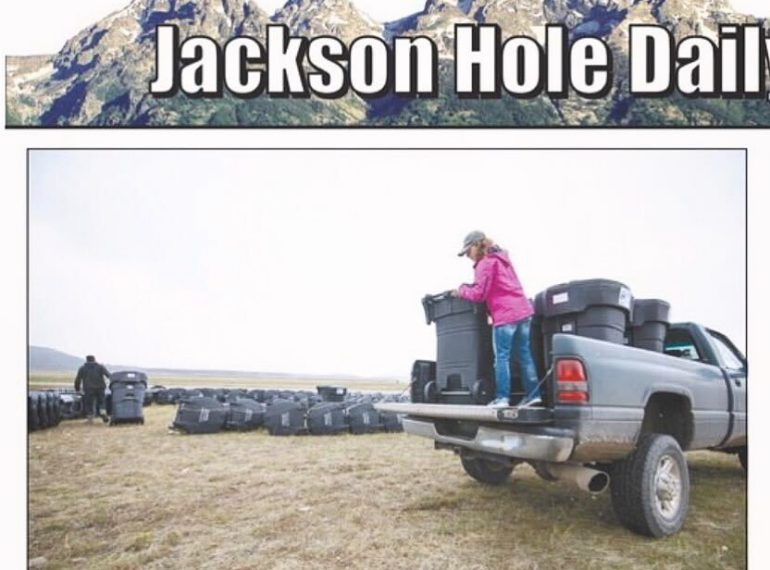Hannah Robart joined us in the spring of 2022 to work on some important projects. Hannah helped to get Jackson Hole Bear Solutions off the ground and into action. She and the JH Bear Solutions Program Manager, Drew Gath, spent time applying stickers to cans, cleaning them up before delivery, and getting dozens of Kodiak bear-resistant cans out into the community. Hannah also worked on the design of educational materials for residents to be bear aware and translated the JH Bear Solutions forms into Spanish. While with us, she was able to attend several different advocacy and government meetings which gave her a window into the behind the scenes actions of an advocacy organization. We wish all the best for Hannah as she stays on at Teton Science Schools as an instructor of outdoor field education classes for the summer. Hannah will likely be volunteering with JH Bear Solutions further this summer and fall.
Before her service term was up, we asked Hannah a few questions about her experience with WWA during her service term. Read all about her thoughts and reflections of her time with WWA below.
- What drew you to the AmeriCorps program?
I was drawn to the AmeriCorps program because I recently graduated college and was looking for new professional opportunities that would also allow me to travel to new places. I was drawn to the Teton Science School AmeriCorps program because it would give me the chance to work in environmental education and work with partner projects in the Jackson community. It has been such an incredible experience and I am excited to be sticking around this summer with TSS and hopefully finding time to volunteer with WWA!
- What is it about the Greater Yellowstone Ecosystem that interests you? Why did you choose this place to serve?
The Greater Yellowstone Ecosystem interests me because of the abundance of megafauna that call the GYE home. I chose to serve here because I have never had the chance to travel this far west (I’m from Pennsylvania). Getting to live this close to two beautiful National Parks was an opportunity that I couldn’t pass up.
- What have you learned about wildlife issues in Wyoming so far that has surprised you?
The most surprising thing I have learned about wildlife issues has been how people truly do care about Wyoming’s animals. I had the opportunity to help deliver bear-proof trash cans with WWA. Talking to the people we delivered cans to really opened my eyes to how much impact a small group of people can have on an entire community.
- What knowledge will you take with you from this experience that will help you in your career and/or conservation efforts?
I think the knowledge I will take with me for my future career is that every voice can have an impact. No matter how small the group of individuals, there is still so much power behind those voices and they deserve to be heard.
- What has been the most rewarding part of your service?
The most rewarding part of my service has been my own personal growth. I have learned so much about myself and have a much clearer picture of what I want to do with my future career. I am looking further into environmental education opportunities, but also know that I want to continue to volunteer with wildlife advocacy in whatever capacity I can.
- After learning about wildlife issues in Wyoming, what advice would you have for anyone who would like to get involved in educating themselves further?
My advice would be to volunteer with any local wildlife advocacy organizations! The best way to learn about these issues is to work with and talk with the organizations that are actively working within the community to make changes.
- What hope do you have for the future for wildlife conservation? Do you think humanity will be able to turn things around before many more species face extinction?
If you would have asked me this question before my service term, I would have been more skeptical. Now, however, I really do think we have a stronger chance of saving species from extinction. There are so many advocacy groups working hard to conserve our species. Even though those with political power often have their own agendas regarding wildlife conservation, as voices for advocacy grow louder, they’ll have no choice but to listen.
- Do you think there is hope that Wyoming will find a balance for grizzlies or do you think we are in for a few more decades of conflict?
After attending the Yellowstone Ecosystem Subcommittee meeting regarding the delisting of grizzly bears from the Endangered Species Act, I am slightly worried that the populations are in danger. However, if the public continues in efforts to secure attractants and pushes for conservation of grizzly bears, I do think there will be hope in finding a balance for grizzly bears and humans.
- What advice would you have for wildlife managers or students who are studying wildlife management currently?
I think my best advice would be to not give up! I’ve seen Wyoming Wildlife Advocates make some big changes within the Jackson Hole community and to surrounding communities in just my short amount of time working with them! In three months they launched a bear-proof trash can initiative, made an important change in Jackson legislature regarding bear attractants, and began delivering trash cans to the public. Oftentimes, small changes can have very large impacts!
Photo: Kathryn Ziesig/Jackson Hole Daily

